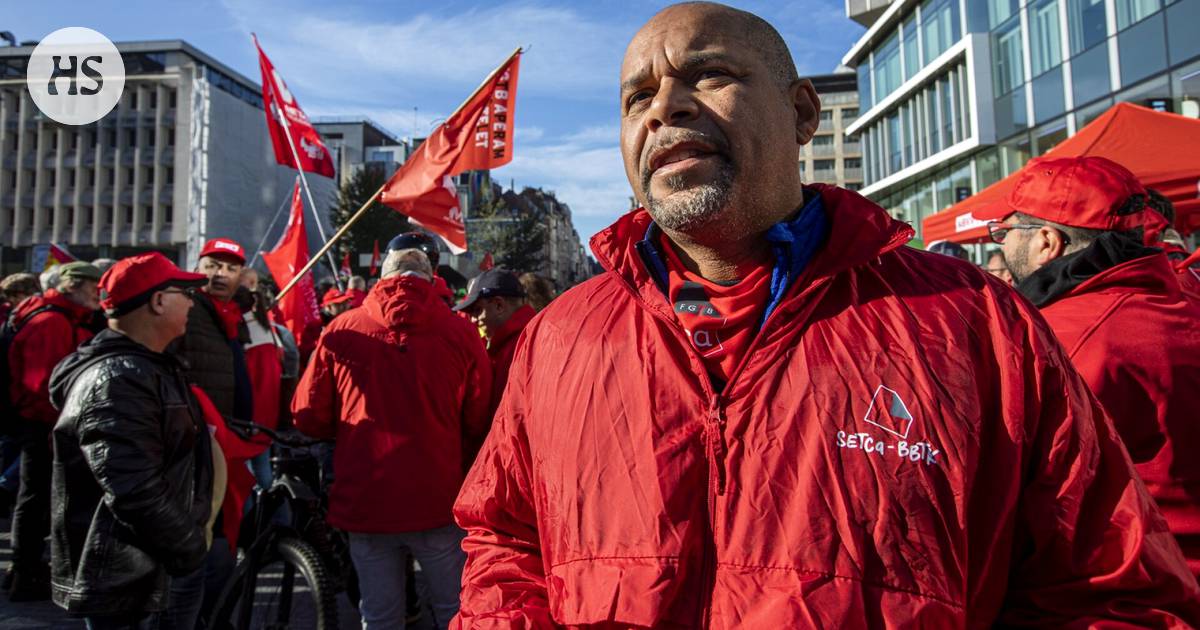Brussels
Brussels the central square Place de la Monnaie is filled with people dressed in blue, red and green coats and caps. The three major Belgian confederations of trade unions have invited their members to a joint demonstration, a “day of action”, which has, among other things, disrupted public transport in the capital. It is not new in Brussels.
Some of the protesters plan to march later on to the house of the Belgian employers’ organization, the local Confederation of Business.
Some are wondering if they should rather march to the headquarters of Engie, or the local Fortum. This demonstration is not only about wages and working conditions, but also about the price of energy.
“I just received a balancing bill of 3,000 euros for gas and electricity,” says the person in the red jacket, i.e. a member of the labor union Kabwe Kabue-Tshibanda.
Three Belgian confederations organized a demonstration in central Brussels on 21 September.
“Can you imagine? I am a team leader in a logistics company, 25 years in the working life, and I get paid about 2,000 euros a month. It’s a pretty good salary in Belgium, and in normal times it has been able to support the family. I couldn’t have believed that it would turn out like this.”
Kabue-Tshibanda says that it is now necessary to save and reduce consumption.
“Less restaurant food and less joy in life.”
Bang and smoke bombs frolicking in the square and Abban Money, Money, Money stop being loud.
According to the police’s estimate, there are ten thousand protesters in total. There are visually the most members of Christian trade unions in green jackets.
The operating day at the end of September is just the beginning. The same unions are planning that on November 9, the whole of Belgium will stop in a general strike.
The unions still have muscle. The trade unions under the three confederations have a total of 3.4 million members, says the adviser on duty at the stall of the blues, i.e. liberals Maarten Boghaert.
“
“When you used to pay 200 euros a month, now the price can be 800-900 euros.”
Maarten Boghaert works as an advisor at the central trade union organization ACLVB. According to him, the unions have already agreed that the September action day is just a foretaste of the November general strike.
In Belgium, the government supports the lowest-income households in energy bills with a so-called social tariff. It means that consumers who fall below a certain income limit receive a discount on the price of electricity and gas from the energy company.
According to Boghaert, this support does not reach the group that is now in the square, i.e. the working lower middle class.
“Many fixed-price energy contracts have changed to variable-price ones. While previously 200 euros were paid per month, now the price can be 800–900 euros. This comes across now everywhere when you talk to people,” says Boghaert.
The employees are not satisfied with the salary development either, says Boghaert. In Belgium, which makes centralized contracts, there is a sector-specific and legally agreed wage standard, which has brought very small increases in wages in recent years. The ay-liike would now like to change this as well, when purchasing power shrinks due to energy.
The Belgian government said at the end of August that it will continue the emergency measures taken due to the rise in energy prices until March next year. Direct support for the lowest incomes will be continued, in addition to which the value added tax on electricity and gas will be kept at six percent and fuel taxes will be reduced.
The government appeals to the banks so that people could more easily get loan repayment exemptions or credits that could be used to carry out energy renovations.
“
Politicians know that the irritation of middle-income people does not bode well.
Wij pikken dit niet (the measure is full), says the sign in the hand of Karolien Pauwels. Plucked chickens were a popular symbol at the demonstration.
Prime minister Alexander de Croo hopes that people will also save energy. The ministries are trying to set an example: the lights in the offices are turned off at night and the maximum temperature in the offices is kept at 19 degrees.
This week, the government will meet again with the social partners. For the unions, what has been done so far is not enough, they want more support measures and energy companies’ extra profits for tax.
In Europe, especially low-income households are affected by energy poverty, i.e. a situation where it is difficult to meet basic needs due to energy costs. However, those who have been getting by comfortably on their salary will also have to face strictures.
Politicians know that the irritation of middle-income people does not bode well.
At the beginning of September, 70,000 people took to the streets in Prague to protest the Czech government, the EU and rising energy prices. The demonstration was organized by the extreme right and left, but they mobilized a number of disgruntled citizens that shocked the government.
Bus driver Theo Swolfs is not worried about his own survival through the winter. “I have solar panels on the roof. But the boy lives alone, and his electricity and gas bills have tripled.”
Big ones The EU countries have hastily piled up support packages to ease the rise in energy prices and dam up worry and anger.
Brussels-based Bruegel workshop has kept records Directing energy subsidies to citizens of European countries since last September. The summary says that the EU countries, supplemented by Britain and Norway, have already spent more than 500 billion euros on various support measures, even though the predicted difficult winter is just coming.
The biggest measures have been taken in Britain, where, according to Bruegel’s summary, the support is 170 billion euros, or as much as 6.5 percent in relation to the gross domestic product.
The most common support in different countries is a tax reduction, which targets, for example, fuel and value added tax. In addition to direct support, governments have set ceilings on price increases, whereby they pay energy companies the difference between the ceiling and the market price.
This will be a big bill for the states, a large part of which will be covered by taking on more debt.
The EU member states have also jointly agreed that they will collect revenue by starting to tax the excessive profits collected by energy companies. That and by taxing fossil fuel companies are supposed to bring 140 billion euros to the state’s coffers.
Place de la Monnaie the demonstration has also gathered members other than union members. by Peter Terry holding a sheet telling people not to pay their energy bills. He says that the Wij betalen niet movement has aroused enormous interest in Belgium.
“If I don’t pay my energy bill, that’s my problem. But if ten thousand people don’t pay, that’s the energy company’s problem.”
The Wij betalen niet movement urges people not to pay their energy bills.
#Energy #received #euro #balancing #bill #gas #electricity #winter #discontent #smolders #Europe








